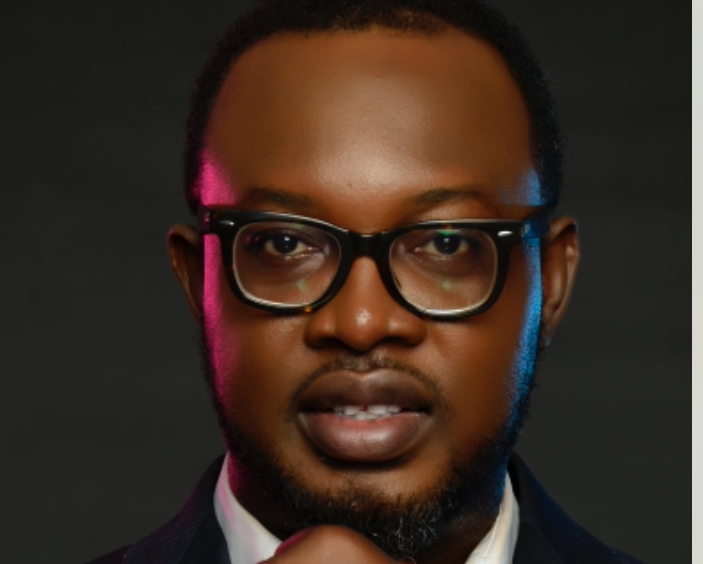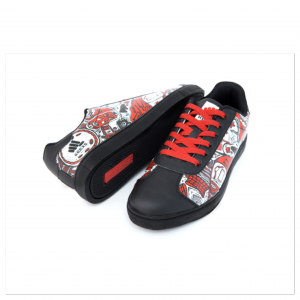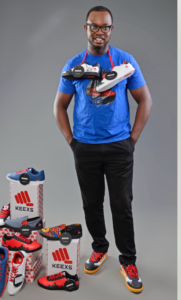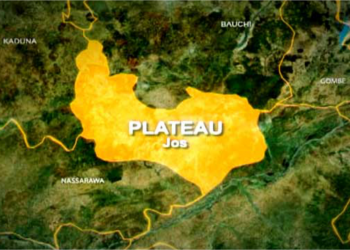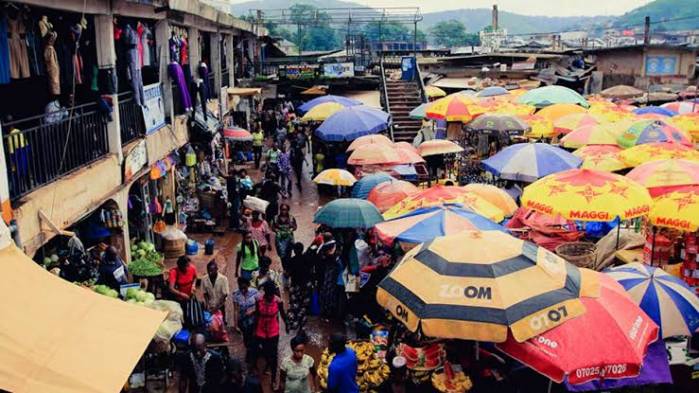“We the citizens need to take more individual and collective initiatives towards correcting some of our social issues ( economy and society ) rather than sitting around complaining and waiting for our leaders to solve everything.”
This is a quote from Mr. Jide Ipaye, the Creator and Founder of Keexs, a sneakers brand in Nigeria. He started the brand when he found it was quite difficult to find shoes in his size so he thought. “Why not make my shoes?” That also morphed into ‘why not make for others and find a way to give back to society as well?’ The story of the birth of KEEXS is quite interesting. He spoke with our Staff Writer, ASIAN NKUTT. Below are the excerpts.
Mr. JIDE IPAYE: I think the answer would be yes. I’ve been in business for a while. I think one of the challenges we have, we know the society we live in, there are a lot of social issues and I said for once there was a need to create something called a profit social enterprise. This is basically creating a business model that is sustainable, but also has the capacity to give back. I felt that was a unique way to build a business model. It’s not something a lot of organizations have done and I said this could be an opportunity. It all started from my shoe challenge and I said why not give it a twist and see how we can create an impact through footwear.
NEXT EDITION: One of the statements in your manifesto is that 10% of your profits goes to poverty alleviation. Can you tell us more about that?
Mr. JIDE IPAYE: Ok. So we are roughly a year old, we haven’t started making profit yet. However, the goal is really simple. If we are making profit we should be able to give back 10% to social projects. We are not interested in giving people money to feed; we are interested in how we can empower them. So rather than give them fish, how can we teach them how to fish? One of the projects I worked on briefly towards the end of last year was the Dustbin Estate project. There’s a place in Ajegunle in Lagos where people live on refuse dumps and there’s an NGO that has been set up called the LOTS Charity Foundation. What they do is they take some of the kids on the streets that are not going to school, feed them, and then they educate them.
By giving food to them it also gives them the impetus to be interested in learning because hungry kids can’t be taught anything in school. We contributed a few things to them towards the end of last year. We gave provisions and shoes as well. When we start our project in terms of the factory set up, we will also look for opportunities to outsource certain parts of the manufacturing process to people within the community so that they are also empowered and are earning something. It could be from sourcing materials or doing certain aspects of manufacturing that doesn’t require machinery to do.
We also partnered with a National ICT Championship programme, which was done at the Queen’s College where young girls partook in an ICT competition. We were one of the sponsors for that. We tend to look for projects that are sustainable and scalable and can add value to the society. We started off we crowd funding and one of the things we talked about was micro lending. When we get to the phase we are able to set up a factory, start to make some good profit, we can also look at how we can work with certain organizations so we can lend to people who are productive and will be able to take loans and turn it around to create more jobs and keep the cycle going. Things like that are some of the projects that we want to be involved with.
NEXT EDITION: What about your partnership with KIVA?
MR. JIDE IPAYE: When we talk about mirco-lending, organizations like KIVA are ones we intend to work with. KIVA is a global Non-governmental Organization (NGO) that works with organizations in their locality to lend money say to farmers. A farmer may be producing maybe a thousand tons of rice and employing 100 people. If he or she is given a loan to expand the business maybe he might be able to produce 3,000 tons and hire 200 more people. To turn that around and pays back the money, which can be given to another as loan.
Read also: Gov. Emmanuel solicits participation of christians in governance
NEXT EDITION: Let’s talk about the product now; you say every shoe tells a story that will inspire you. Tell me the stories behind the shoes.
MR.JIDE IPAYE: This was tied into the Lagos at 50 initiative. This particular shoe is part of the Ibile collection. Ibile means the original five administrative zones that Lagos was created with. You have Ikeja, Badagry, Ikorudu, Lagos Island and Epe. It also means local, history, heritage. If a stranger comes to Lagos, for you to be an ibile you need to experience certain aspects of Lagos. What we did is we took our DNA as a brand and also took some history from Lagos and added to it. You will see the national theater as one of the monuments here; you will see some tribal arts. It’s telling a story about Lagos and some of the things you will notice here. Lagos is also an innovative place so you will see a phone and a chip to denote that. You will see the heart, which is giving back. There are other places, which show sites you should visit in Lagos.
NEXT EDITION: You won the TEF program in 2016, how did that help KEEXS?
MR. JIDE IPAYE: The Tony Elumelu Entrepreneurship Programme is almost a one-year initiative .You start from an online portal where you go through a review of your business plan and ideas. You are basically put through a revalidation process. The system is online and it helps you to check some of the things you have assumed. They also assign a mentor to you, which is also a very good thing because it gives you the opportunity to also share ideas with someone who is more experienced than you are. And then considering that you have a thousand people who attended our batch, it gave us access to a wider network, not just in Nigeria but internationally. Through that forum we have one of our partnerships with a retailer in Dubai who is reselling KEEXS as well. And then there are groups so we are constantly sharing ideas, some of us are in the fashion industry, others are not. That whole network is really huge so for an entrepreneur that’s trying to start up; it’s a great virtual support system. I was in Madagascar last year where I met with one of the TEF alumni; almost every country in Africa has a TEF entrepreneur. The access to the network is quite vast. And we got a seed grant of $5, 000, which was a great encouragement.
NEXT EDITION: Talking about TEF, how did it feel to customize shoes for Mr. Tony Elumelu?
MR. JIDE IPAYE: He was extremely impressed, he was short of words and it was really a privilege to get to meet him considering that there were about 45,000 thousand people across Africa that applied for the TEF programme. And a thousand people were nominated and we were one of those. Our own little way of saying thank you was the pair of customized shoes we gave to him.
NEXT EDITION: Are you telling me if I want to customize a pair, I can contact KEEXS and have it done?
MR. JIDE IPAYE: The answer would be Yes and No. The level of complexity involved in customizing a pair of shoes is not cost effective at this point where we are right now. But we have actually started working with some local artists, this is also part of building our tribe. They will be doing the hand customization and earn a living from it. It’s also a way of giving back by collaborating with local artists to get art on some of these shoes.
NEXT EDITION: A lot of business especially new ones have to deal with setbacks, what were some you faced and how did you overcome them?
MR. JIDE IPAYE: The first thing was really the idea. It‘s one thing to have an idea, it’s another thing to bring it to life. We used crowd funding to bring ours to life. The concept of it is totally new to some people in Nigeria even in several parts of Africa. It took quite a bit of convincing and explanation for some people to understand what we were doing. It was a huge challenge originally to try to get people to come on board the crowd funding. The second wave of challenge we have had to face is retailing. Nigeria is not a very structured retail environment. In other parts of the world, putting your shoes in one retail chain opens you to their other channels all over the world. Expansion capital is also a challenge. Recently, we were nominated amongst potential awardees for a grant which is a programme by the World Bank and the Federal Ministry of Trade and Investment. This is a small contribution towards setting up the factory. We have had to outsource our production because we don’t have the facilities to do that yet. If we set up the factory we still have to worry about where the shoes will go so that still needs to be sorted out. So we need to drive the retailing and eventually get to the manufacturing.
NEXT EDITION: So how can the public help KEEXS?
MR. JIDE IPAYE: It comes down to buying the product; sharing the story on the product and helping us find avenues to roll out the product. We are also looking at international markets on how we can work on channels. We are working with The Nigerian Export Promotion Council ( NEPC ) as well, they’ve been quite supportive. We’re trying to see how we can attend trade shows internationally, to be able to start to seed our product into different markets. But locally, Nigerians also have to keep buying to help us grow. This is a Nigerian/African brand that has a global appeal.
NEXT EDITION: What advice would you give to young entrepreneurs planning to start business that’s not so quite in the norm? Or just looking to start a new business?
MR. JIDE IPAYE: Think big, Start small. A lot of businesses need to understand that there is a learning process for any start up especially when you are going into an area you don’t understand or is new, you will have to learn. Also, there is no such thing as being totally innovative, someone somewhere has done it before so you need to ride on the shoulder of giants, you can learn from them. They need to read more, expand their minds and learn what is happening. People also need to travel, to expose themselves to see what is out there so you can come back and apply it. But most importantly – Dream big, but start small. Try and prove your business, gain investor confidence and don’t be in a hurry to become a success overnight. Most overnight successes tend to crash quickly so we have to take baby steps and grow.
